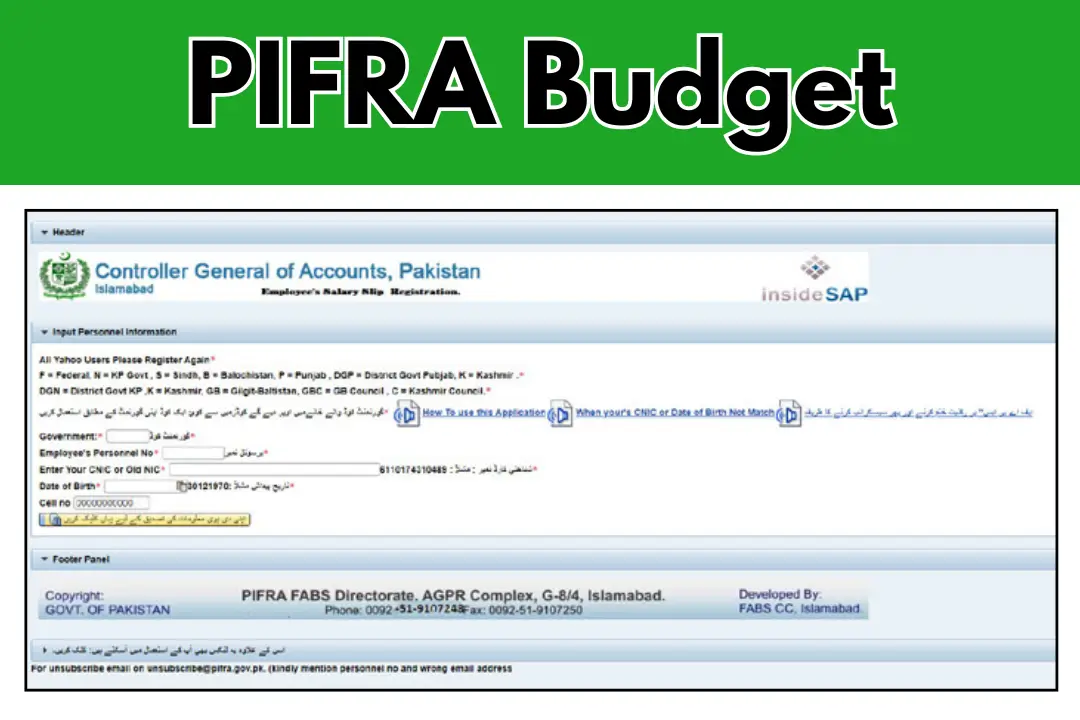The PIFRA Budget refers to the budgeting system under the Project to Improve Financial Reporting and Auditing (PIFRA) in Pakistan. Developed to enhance financial transparency, this initiative plays a vital role in managing the country’s public funds more efficiently. In a world where public financial accountability is a growing concern, systems like the PIFRA Budget have become critical for better governance.
PIFRA was initiated with the goal of modernizing and digitizing the government’s accounting, auditing, and budgeting processes. It seeks to reduce human errors, minimize corruption risks, and ensure that financial reports are timely and accurate. The PIFRA Budget module specifically focuses on streamlining how federal and provincial budgets are created, revised, and managed, using an integrated system.
What Is the PIFRA Budget Module?
The PIFRA Budget module is a digital framework integrated into Pakistan’s financial management system. It allows various government departments to submit, track, and monitor their budgetary allocations online. By replacing paper-based workflows, it has significantly reduced delays and improved coordination among departments.
How PIFRA Enhances Budget Transparency
One of the key strengths of the PIFRA Budget system is how it promotes budget transparency. With all budget entries and revisions recorded digitally, there is a clear trail of documentation. This helps government auditors and management bodies ensure that public funds are allocated and spent appropriately.
Benefits of Using PIFRA for Budget Management
The adoption of the PIFRA Budget system has brought numerous advantages to public finance administration. These include:
- Greater accuracy in budget formulation and reporting
- Real-time access to financial data for decision-makers
- Enhanced accountability and reduced opportunities for misappropriation
Streamlined Budget Execution Through Digital Tools
The PIFRA Budget system allows for smoother execution of approved budgets by automating the allocation process. Once a budget is approved, the system allocates funds to respective departments automatically. This minimizes the time lag between budget approval and implementation, which is often a cause of inefficiencies in traditional systems.
Integration with SAP and Other Government Systems
The PIFRA Budget system is integrated with the SAP-based Financial Accounting and Budgeting System (FABS). This enables seamless interaction between different governmental functions such as payroll, procurement, and audit. The integration ensures that changes in one module are reflected across all connected systems, improving consistency in financial data.
Budget Forecasting and Data Analysis
Another major advantage of the PIFRA Budget system is its capability for budget forecasting. It collects historical financial data and helps departments predict future budget requirements. This forward-looking approach allows better planning and allocation of resources based on actual needs rather than estimations alone.
Training and Capacity Building Under PIFRA
The success of the PIFRA Budget system depends heavily on how well the staff are trained to use it. Recognizing this, the government has initiated numerous training programs for finance and accounting personnel. These programs aim to ensure that users understand the system’s functionalities and can use them to their full potential.
- Training is provided both in-person and online to cover a broad audience.
- Continuous support is available via helpdesks and user manuals.
- Special focus is placed on capacity building in remote and underdeveloped regions.
Challenges in Implementing the PIFRA Budget System
Despite its many benefits, the PIFRA Budget system has faced some challenges. Resistance to change, limited internet access in rural areas, and a lack of digital literacy have hindered full adoption. Additionally, system downtimes and technical glitches occasionally disrupt the workflow, although such issues are gradually being addressed.
The Future of PIFRA and Public Financial Reforms
Looking ahead, the PIFRA Budget system is likely to be further upgraded to incorporate artificial intelligence and advanced data analytics. This will not only improve the speed and accuracy of budget management but also allow for more dynamic financial planning. As more public institutions come under the digital fold, the PIFRA Budget will play a critical role in transforming how Pakistan handles its fiscal responsibilities.
Conclusion
The PIFRA Budget is more than a software tool; it is a foundational element in Pakistan’s pursuit of financial transparency and efficient governance. By digitizing budget processes and making data more accessible, it empowers both policymakers and citizens. Continued investment in this system, along with education and infrastructure, will ensure it reaches its full potential in shaping a more accountable public sector.

